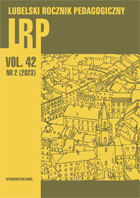FORMALNE I NIEFORMALNE STRATEGIE W PRACY OPIEKUNKI W ŻŁOBKU
FORMAL AND INFORMAL STRATEGIES IN THE WORK OF EARLY YEARS
PRACTITIONER
Author(s): Krystyna Heland-KurzakSubject(s): Preschool education, State/Government and Education, Sociology of Education
Published by: Wydawnictwo Naukowe Uniwersytetu Marii Curie-Sklodowskiej
Keywords: early years practitioner; strategies in the nursery; tacit knowledge; relationships with parents; relationships with children; relationships with the manager;
Summary/Abstract: Introduction: The article concerns the strategies in the work of early years practitioners in terms of the relationships they create with children, colleagues at work, management or parents. The description of tacit knowledge is presented in the light of the nursery’s resources, not its weaknesses.Research Aim: To show how relational tacit knowledge is visible in the work of early years practitioners in nurseries.Method: The study involved 20 early years practitioners in Warsaw, it was an in-depth inter- view. The study used the framework of Collins’ theory of explicit and tacit knowledge. The analysis of the interview data was carried out using the MAXQDA 2022 software. The part of the interview concerning the research results presented in this article contained 12 questions. Results: When analyzing the coded fragments about the strategies used in conversations and coope- ration with the nursery management, they were divided into two parts. The first part of the strategy is applying them to a manager who is considered to be a trustworthy, helpful, committed, under- standing person. The second part of the strategy is to apply them to a manager who is considered to be unpredictable, unorganized, unjust in financial management, unjust in managing employee resources, and uncommitted. Most early years practitioners declare an open strategy of conversation towards their colleagues and children, based on the directness of the message and honesty of ex- pression. The early years practitioners declare that they use the sandwich method with their parents. Conclusions: It was observed that the greatest intensification of informal strategies occurs in the relationship between the early years practitioners and parents. In the statements of the re- spondents, it was noticeable that even if relational tacit knowledge tries to see the light of day, it is basically one-sided in the form of requirements for parents to meet the expectations of the nursery. It is difficult for parents to implement the rules prevailing in the nursery to the rules prevailing at home.
Journal: Lubelski Rocznik Pedagogiczny
- Issue Year: 42/2023
- Issue No: 2
- Page Range: 211-224
- Page Count: 14
- Language: Polish

